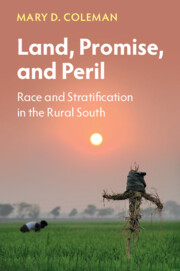Book contents
- Land, Promise, and Peril
- Cambridge Studies in Stratification Economics: Economics and Social Identity
- Land, Promise, and Peril
- Copyright page
- Contents
- Figures
- Tables
- Preface
- Acknowledgments
- Part I The Family in an Intemperate Community, State, and Nation
- Part II Family Interiority and Economic Mobility Pathways
- 7 Perennial Sharecroppers
- 8 Quasi-Croppers and Family Interiority
- 9 The Mule-Renter’s Son
- 10 The Byrd Farmers
- 11 Contemporaries of the Second Sunflower Generation
- 12 Central Hills Family and Place in Struggle
- Part III Pathways toward Upward Economic Mobility
- Select Bibliography
- Index
11 - Contemporaries of the Second Sunflower Generation
from Part II - Family Interiority and Economic Mobility Pathways
Published online by Cambridge University Press: 15 April 2023
- Land, Promise, and Peril
- Cambridge Studies in Stratification Economics: Economics and Social Identity
- Land, Promise, and Peril
- Copyright page
- Contents
- Figures
- Tables
- Preface
- Acknowledgments
- Part I The Family in an Intemperate Community, State, and Nation
- Part II Family Interiority and Economic Mobility Pathways
- 7 Perennial Sharecroppers
- 8 Quasi-Croppers and Family Interiority
- 9 The Mule-Renter’s Son
- 10 The Byrd Farmers
- 11 Contemporaries of the Second Sunflower Generation
- 12 Central Hills Family and Place in Struggle
- Part III Pathways toward Upward Economic Mobility
- Select Bibliography
- Index
Summary
Second-generation children considered here have included Andrew Brown, the son of Agnes Brown; Eddie Landfair, the son of Josie Landfair; and Isaac Byrd, the son of Hattie Byrd and cousin of Lonnie Byrd. Like Andrew, Eddie did not see himself as a failure, yet he acknowledged that he did not have enough ambition. So far, not one male or female child in this cohort has blamed the white man for his or her limited opportunities, let alone her or his failures. Each of the sons, Edward and Andrew, was preaching to the next generation about ability and effort. Edward’s mother, a sharecropper for forty years, taught him to work hard, demand respect, not to take a back seat, to be himself and believe in God. He passed these words and values on to his children. The sharecropper’s mother seemed to have known better than Andrew Brown, the high school principal, that respect was owed to each human being and should not be premised on ability. Devaluing others because of their limited ability or lack of opportunity is not just evidence of a lack of empathy; it is also an invitation to see people as less worthy of investment and support.
- Type
- Chapter
- Information
- Land, Promise, and PerilRace and Stratification in the Rural South, pp. 211 - 221Publisher: Cambridge University PressPrint publication year: 2023

